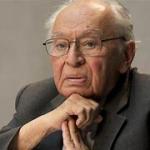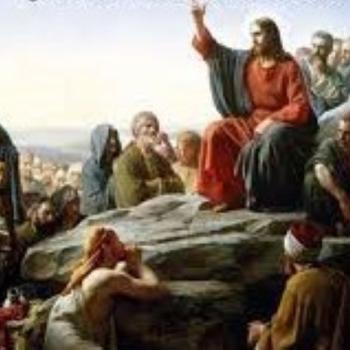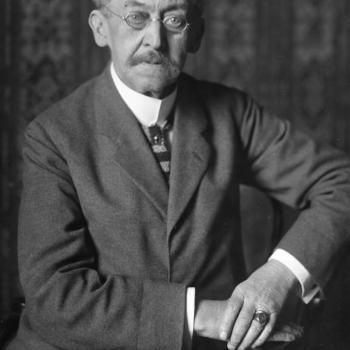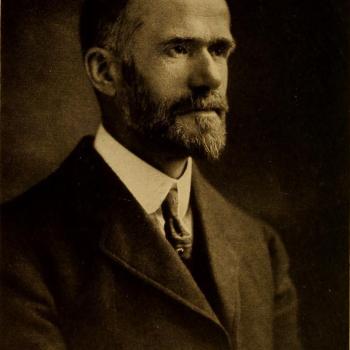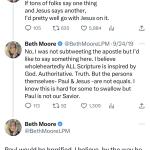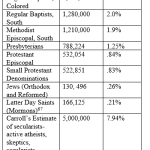Recently, while reading a highly regarded commentary on the Book of Numbers, I realized a fairly common preaching “trope” I have heard for years from the pulpit was indeed quite erroneous. That trope, or “commonly repeated conventional view,” has to do with the reason God prevented Moses from entering into the promise land. It is an exegetical point that may not seem all that important. After all, we realize that Moses, like everyone, was a sinner. And, we know that sinners sin. Moreover, we also know that in doing so, sinners often forfeit the right to what would otherwise be an appropriate reward or “blessing.” This is not a terribly controversial idea in Jewish or Christian theology. It also seems to be a basic fact of experience that anyone can understand, regardless of religious persuasion: if you screw up, you may not get what you wanted.
However, thinking a bit more carefully about it, it does seem a fairly big deal that the greatest prophet of his time; the greatest prophet in all of Jewish history; and the man who executed God’s second most powerful act of redemption in human history, the act that foreshadowed the greatest act of redemption in human history–Christ’s atonement– was not allowed to see the reward of his labors. And so the question reemerges: why indeed was Moses not allowed to enter into the promised land?
The Passages in Question
There are two passages in Scripture, Exodus 17:1-7 and Numbers 20:1-13 that seem to relay two versions of the same incident. Here is the version from Numbers:
In the first month the whole Israelite community arrived at the Desert of Zin, and they stayed at Kadesh. There Miriam died and was buried.
2 Now there was no water for the community, and the people gathered in opposition to Moses and Aaron. 3 They quarreled with Moses and said, “If only we had died when our brothers fell dead before the Lord!4 Why did you bring the Lord’s community into this wilderness, that we and our livestock should die here? 5 Why did you bring us up out of Egypt to this terrible place? It has no grain or figs, grapevines or pomegranates. And there is no water to drink!”
6 Moses and Aaron went from the assembly to the entrance to the tent of meeting and fell facedown, and the glory of the Lord appeared to them. 7 The Lord said to Moses, 8 “Take the staff, and you and your brother Aaron gather the assembly together. Speak to that rock before their eyes and it will pour out its water. You will bring water out of the rock for the community so they and their livestock can drink.”
9 So Moses took the staff from the Lord’s presence, just as he commanded him. 10 He and Aaron gathered the assembly together in front of the rock and Moses said to them, “Listen, you rebels, must we bring you water out of this rock?” 11 Then Moses raised his arm and struck the rock twice with his staff. Water gushed out, and the community and their livestock drank.
12 But the Lord said to Moses and Aaron, “Because you did not trust in me enough to honor me as holy in the sight of the Israelites, you will not bring this community into the land I give them.”
13 These were the waters of Meribah,[a] where the Israelites quarreled with the Lord and where he was proved holy among them.
As we can see, the Israelites, as per the norm, are grumbling about a lack of sustenance in the wilderness. They have no potable water in the desert. Now, we should be fair. It does seem reasonable for Israel to at least inquire about this problem, perhaps even forcefully inquire. However, as usual, they immediately regress to their typical litany of complaints. They argue with Moses about the very nature of their liberation from Egypt, they moan about how it would have been better to have died with their brothers (those killed in the Korahite rebellion mentioned a few chapters earlier), and, in spite of all the previous miracles, they believe that now they really will die in the wilderness, along with all their livestock.
Of course, God does not punish them for this complaint. He will meet their needs. After all, they are dying of thirst. And, it is common to man, even having seen God’s wonders and mighty works, to despair in the moment of tribulation. I myself still despair in various times and under various circumstances, even though I have experienced, and have knowledge, of both God’s presence and His ultimate purposes for my life. I have written those experiences, in part, here. As such, I am no different than the Israelites when I thirst–whether in the body, or the soul.
It is not the Israelites’ complaint here that is the problem, although there are certainly spiritual lessons to learn from their attitude. Nevertheless, one can understand why Moses might get angry with them. Given this is not the first time he has been called to work a wonder on their behalf, nor is it the first time he has heard their complaints, we can resonate with Moses’ frustrations. They seem natural and not unwarranted.
Still, this is where many pastors feel Moses makes his great error, the sin that ultimately prevents him from being able to go into the Promised Land. It should be said, moreover, that this is a promise we imagine would have been truly gratifying for the great man. After all, he has rendered a long and arduous service to God. If we didn’t already know the story, we would want Moses to enter the land. We would desperately want it, because we know what it is like to work and toil so hard for a goal yet to fail to see it realized!
The Standard Interpretation: Moses’ Anger Prevents His Entry
Some have noticed that in the parallel passage in Exodus 17, God tells Moses to strike the rock, but what Moses actually does, as recorded in Numbers 20, is strike the rock twice. According to some, then, it is this second strike of the rock with the rod that is an act of disobedience to God’s command, and, therefore, that which motivates God to punish Moses. But this seems odd? It is not clear exactly how many times God wanted Moses to strike the rock. God does not say “strike the rock once, and only once” or anything like that. The striking itself doesn’t seem like it can be the source of the sin; at least not the sole source.
However, it is not merely the second strike that many believe is the problem. It is the anger that Moses apparently displayed, and perhaps motivated him to strike twice, that is at issue. And this is where many pastors today land, saying that because Moses got angry with Israel, he misrepresented God. This is not to say that these pastors are without good company. The idea that it was Moses’ “irascibility” that caused him to lose the Promised Land has its historical defenders. However, as Jacob Milgrom points out, it was Ramban (Maimonides) himself who showed that Moses’ anger cannot be the sin that caused him to lose his greatest blessing:
We focus first on the popular contention that Moses’ irascibility was the source of his sin … a contention that Ramban effectively rebuts: (1) God’s condemnation — ‘You did not trust Me … you disobeyed My command’ (20:12,24) — cannot refer to anger. (2) Aaron was not guilty of anger. Why was he also punished? (3) Most important of all, our text is not an isolated case of Moses’ petulance; for example, Moses was wroth with his army officers (31:14) without provocation. Ramban’s apt illustration has Moses venting his spleen only on Israel; we add that it could border on heresy when directed against God.
Jacob Milgrom, Numbers, 448
In sum, Ramban shows that Moses could not have been punished by God for his anger, because first God never commanded Moses to not get angry. Yet God says Moses disobeyed His command (v 20:24). The question then is “which command” did Moses break? We will see later, it is a very serious command that Moses transgresses. Second, Aaron is punished along with Moses, he dies shortly after the incident at Meribah apparently for breaking the same command as Moses. Yet Aaron did not display any anger that we know of, so why would he be punished in the same manner if anger was the sin? Finally, Ramban points out that Moses gets angry in other places in the wilderness wanderings, often without provocation, yet he is not punished for these.
If anger is not the issue then, what is it? Milgrom points out that there is a very clear textual clue that tells us why Moses and Aaron incurred this punishment. It was not what Moses did, or how he did it, or what his temperament was like when he did it. It was Moses’ words that mattered to God.
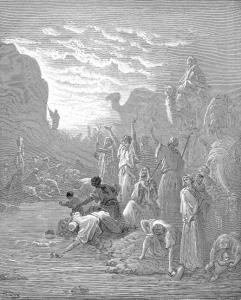
What Did Moses Say?
If striking the rock, once or twice, and being upset were not the reasons for Moses failing to enter the Promised Land, then what else could it be except what Moses said to the Israelites while he was carrying out the act? Is it Moses calling the Israelites “rebels” that incurred God’s wrath?
That would seem hardly the case, since Moses avails himself of that term in other places without retribution. Not only that, but later prophets like Ezekiel and the Psalmist also appropriate the word “rebel,” justly applying it to Israel (Eek 20:8, Pss 78:17, 106:33) for indulging in their wicked ways. Finally, God Himself, in whom there is no falsehood, repeatedly calls Israel rebellious. As Milgrom points out, “Indeed had not God Himself earlier dubbed the Israelites ‘rebels’ (Num 17:25)?”
It seems wrong that God would punish Moses and Aaron for simply saying what was obviously true. Thus, it must be what follows that is the true source of Moses’ sin. And in the very next clause we see the problem:
“Listen, you rebels, must we bring you water out of this rock?”
The key term in Hebrew here is “nosti” or “we.” According to Bekhor Shor, it is on this word that Moses’ sin hinges:
Bekhor Shor has a single terse comment on this word, pointing to the resolution of our enigma: ‘The sin resulted from saying nosti‘, ‘shall we draw forth,’ and they (Moses and Aaron) should have said ‘yosti‘ ‘shall He draw forth,'” meaning God.
Milgrom, 451
Beker Shor’s interpretation was not the first, Hananel ben Hushiel of Kairouwan (ca. 980-1056) and Ramban also made the same observation before him. So, what is the problem with Moses, and Aaron vicariously, saying “shall we” draw for the waters? At this point, most Christian readers will see the problem, and also see why Moses is going to be worthy of retribution for the words he has spoken.
Moses, Magic and Weaning of Israel from Idolatry
In Matthew 12:37 Jesus says “By your words you will be acquitted, and by your words you will be condemned.” He also says that “For the mouth speaks what the heart is full of” (Matt 12:34). These are of course spoken in dialogue with the Pharisees, whose hearts Jesus knew to be full of evil. But we do not think of Moses, the most humble of all men on the face of the earth at his time (Num 12:3), as being wicked like the Pharisees.
Nevertheless, when speaking just before the miracle at Meribah, we see that even Moses can be tempted to break the most fundamental of all commands, namely, the first commandment to not have any other gods before Yahweh, as well as the second, to not have or make any false representations of Yahweh. Moses seems to be on the verge of doing both here when he begins to take credit for what is about to happen: water coming out of a rock!
In speaking the word “nosti” instead of “yosti” Moses is indeed trending downward. He is beginning to attribute divine powers to himself, taking credit for miracles for which he is not the responsible agent. Instead of speaking as God’s servant, Moses is acting more like the magicians in Egypt, who exercised miraculous powers through their own coercive magic. Milgrom explains the seriousness of this transgression:
Hence, Moses’ statement ‘shall we…’ clearly implies that what followed was his miracle not God’s. In other words, the nature of the sin–far from being obscure or unjustified–is now projected with startling clarity; it was not an ordinary transgression. In defying God, Moses did not merely countermand His order; indeed, his behavior could be interpreted as a denial of God’s essence. In the sight of the assembled throngs of Israel, Moses and Aaron missed the opportunity to ‘sanctify’ God … ‘before the eyes of the children of Israel’ …. Instead they showed no trust … acting treacherously … rebelling against God … setting themselves up in His place, arrogating to themselves the divine power to draw forth the water miraculously from the rock.
Milgrom, 451-452
The taking credit for what only God can do, control the forces of nature, is equivalent to making oneself out to be God (or, at least, a god). We cannot say that Moses does this with absolute intentionality, but still, in his word usage, is a clear misrepresentation of who God is vis-a-vis man. Moses seems to be slipping here psychologically and spiritually. But it is no minor slip up. It is morally equivalent to Aaron’s dramatic screwup when pressed about making the Golden Calf (Exodus 32). It is a transgressing, or at least a move toward transgressing, the first two commandments. For if Moses is attributing the power of God to himself, or even if to the staff he wields, then he is positioning himself not unlike the Pharaoh from whom the Israelites have just fled. But Pharaoh is no “God-man” just as Moses is not one either.
Milgrom further highlights the incredible weight of this:
Considering that Moses’ generation had hardly been weaned from the bondage of Egypt, his error was neither slight nor pardonable. Israel had to be released from more than chains; it still had to be purged of its pagan background. In being redeemed from Pharaoh, it had yet to be bound to its God.
Miilgrom, 452
This is the reason why Moses’ punishment is so severe, because his words at this critical moment were antithetical to everything that God had been using him to do. Moses was putting the entire project in jeopardy in this sense. The divine purpose of God is to remove us from the presence and power of false gods. In using the pronoun “we,” Moses was tempting the Israelites to treat him not as a prophet of the one and only sovereign God, but as a magician compelling Yahweh, who is just one of the many other gods, to do his bidding.
It is this confusion of Yahweh with other local, ethnocentric gods, with contingent beings, that we often call “syncretism.” It is something we will see occur throughout Israel’s history, especially during the monarchy (cf. 2 Kgs 23:12-14). It is the fundamental sin that all the other prophets to come after Moses will have to confront Israel for committing–the thinking of Yahweh as equivalent to Baal, or Osiris, or Dagon, or Zeus, or whatever other little, created gods may exist. It is for this reason, and this reason only, that Moses is prevented from reaping the reward of the Promised Land; not because he got angry.
Prophets or Magicians Among Us?
To believe God would punish someone with so great a punishment because they were simply angry is, actually, quite distorted thinking about God. But once we recognize what Moses was guilty of, and how that matches up with God’s divine purpose for humanity, we realize the justice of God’s actions. We also realize why the Jewish authorities were adamant about condemning and killing Jesus. After all, Jesus was clearly setting himself up as far more than a mere prophet. Of course, the difference between Moses and Jesus is an ontological one: for Jesus really is the Godman. The divine power really is Jesus’ power (Matt 3:11; Mark 5:30; Luke 8:46).
Moses, however, was not divine. Given Moses’ sin, we might imagine an even greater punishment than just failing to enter the promise land. But Moses was genuine a man after God’s own heart, and, as said above, the humblest man to walk the earth. As such, God’s punishment fits the severity of the transgression, and acts as a deterrent for a wayward Israel.
However, for those who make this error today, in light of the revelation of Christ, not entering into the promised land entails something far more profound for them than for Moses. For Moses it only meant not physically entering into the geographical space known as Israel. For us today, this error could mean not entering into the physical and spiritual space knows as “the new heavens and new earth.” These consequences are not finite, but everlasting.
That said, there are many like Moses who start off close to God, and who are intimately familiar with His plan and His power. Yet, there comes an inevitable temptation for those who are ministers of Christ to start to attribute not only the power of God to themselves, but even the identity. Today, we see a similar inclination in some “Christians” who self-identify as “prophets,” yet who talk about God as if they can manipulate Him to work miracles on their behalf. These talk about tapping into the miraculous power of God, about forcing God to do the miraculous. In doing this, they set themselves up as magicians, not prophets. For it is the magician who can compel god as if he were some minor spirit. Of course, if the magic works, it is not God being compelled, but something quite different indeed.
When these “prophets” do this, they not only elevate themselves they demote God. For these, then, the danger is great. Christ spoke of people like this as such:
21 “Not everyone who says to me, ‘Lord, Lord,’ will enter the kingdom of heaven, but only the one who does the will of my Father who is in heaven. 22 Many will say to me on that day, ‘Lord, Lord, did we not prophesy in your name and in your name drive out demons and in your name perform many miracles?’ 23 Then I will tell them plainly, ‘I never knew you. Away from me, you evildoers!’
There would have been no doubt in the Israelites’ mind that Moses was doing the miracle “in the name of Yahweh.” However, if Moses’ words made it seem like Yahweh was less than the sovereign God of the universe; something smaller than the Creator and Ruler of the cosmos and everything in; something like a minor deity who could be compelled to do what Moses desired, well then, the same goes for those who make Christ either just a man, or some genie in a bottle who will do their bidding if they only say the right words or make the right incantations. They too will be barred from entering the Promised Land, and their punishment will be just.




